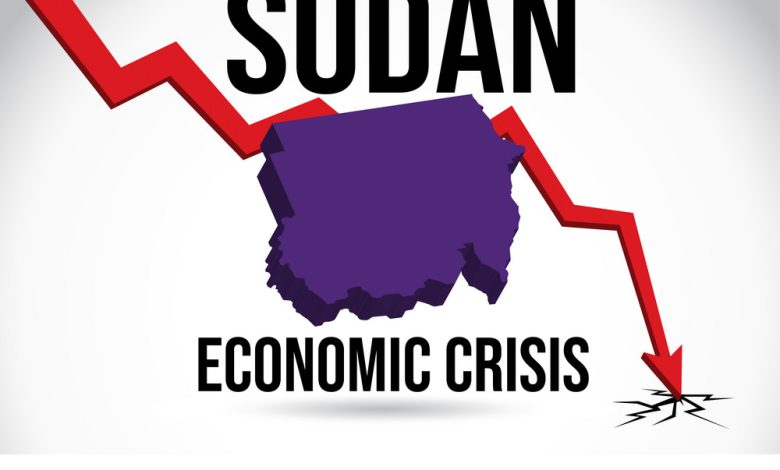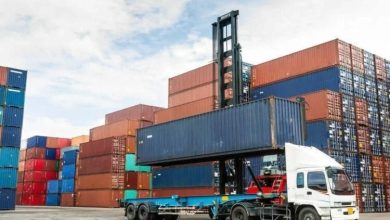A year after the war: Sudan’s economy… devastating losses

Rehab Abdullah – Nahid Oshi
One year after the devastating war that broke out on April 15, 2023 between the Sudanese army and the Rapid Support Militia, the economy and living conditions in the country are witnessing a complete collapse and catastrophic conditions, after the state treasury lost more than 80% of its revenues in the wake of a significant decline in gold exports, economic rates fell to their lowest levels. The Sudanese pound was falling daily and its value was collapsing against foreign currencies after the price of the US dollar reached 1,430 pounds, with expectations of further rise in the coming days. This was followed by a rise in the prices of basic commodities, including food and fuel, at a time when he confirmed experts inflation rates are increasing, and the World Bank expects the economic growth rate to decline to negative (18.3%).
Systematic destruction
The war led to the systematic destruction of infrastructure and facilities, including factories, production institutions, and agricultural projects, including the largest agricultural project in Sudan (the Gezira Scheme) after it was invaded by the Rapid Support Militia, with the destruction of the banking sector and the flight of local and foreign investment, and damage to the livestock sector, in addition to damage to citizens, employees, and people with marginal professions, their conditions deteriorated after they lost their savings and their homes, which were destroyed and looted due to the war.
It is clearly evident that the Sudanese economy has incurred huge losses, and most families have lost their source of income, with poverty rates rising to more than 65%. The direct economic losses of the war were estimated at more than 100 billion dollars, according to unofficial data, while Sudanese Finance Minister Jibril Ibrahim expected that the war’s losses would reach 200 billion dollars.
Banking sector losses
Perhaps the most prominent sector affected by the war is the banking sector, as it was exposed to clear destruction. The process of theft, looting, and burning affected more than 100 bank branches, 37 of which were government and private banks. The war caused the closure of 70% of the banks in the combat zones, according to the Central Bank of Sudan, as indicated by Confirmed information indicates that the percentage of money looted from banks is estimated at about 38% within Khartoum State.
Observers have warned that some banks may go bankrupt or be liquidated, and economic expert Professor Ibrahim Onur said that out of three banks, two are at risk of bankruptcy.
The Director General of the National Export Finance and Insurance Agency, Ahmed Babiker Hammour, confirmed that banks are facing various difficulties, including the loss of stolen cash funds, the destruction of assets, and the cessation of debt collection from customers, in addition to the cessation of new financing. He stressed in his speech to (Al-Ahdath) that all of this largely leads to financial losses on Sudanese banks without exception. He expected that the final accounts of banks for the year 2023 would witness a large deficit for most banks. He expected that if this situation continued, some banks would fail to continue and this might lead to liquidation or merger.
Ahmed Hammour stressed that the Deposit Guarantee Fund can play a role in reducing this possibility, unless the size and number of banks that need support are so large that the Fund is unable to provide sufficient assistance.
Oil sector losses
The Sudanese Minister of Oil, Mohieddin Naeem Mohamed Saeed, said that the country lost about 210 thousand barrels of crude as a result of the sabotage of the crude depot at the Khartoum refinery and the destruction of other facilities, including the gasoline and gas depots that were filled with petroleum products.
The minister indicated, in an interview with the Sudan News Agency, that the destruction of the warehouses of the distribution companies located in the Jili control center led to the loss of estimated quantities of petroleum products for all companies, but he pointed out that the refinery body was not harmed.
The Minister estimated the extent of the destruction inflicted on the energy and oil sector at $5 billion, explaining that the damage included oil installations and power stations and the loss of crude oil and petroleum products stored in strategic warehouses produced by the Khartoum Refinery. However, he confirmed the availability of fuel for all sectors and that it is imported from abroad.
The collapse of the meat sector
Undersecretary of the Ministry of Livestock and Fisheries, Dr. Hassan Al-Toum, confirmed the loss of many components of the sector, as the protection of the national herd declined by 50% from what it was before the war due to the central laboratory for the production of veterinary vaccines being out of service since the first week of the war and the theft of its production contents, which negatively affected the protection of livestock and fisheries. The herd, in addition to the ministry’s infrastructure being affected by looting, theft, the destruction of furniture and buildings, the theft of 60% of the fleet of vehicles operating in the ministry, and the complete collapse of the poultry sector because 85% of poultry production is in the states of Khartoum and Gezira, which are two states of war. “Therefore, this sector has ended and needs to be rehabilitated from scratch,” He added. Noting that veterinary quarries, especially quarries in Kordofan states, have been affected due to insecurity, the complete cessation of technical operations, and increased burdens on safe quarries in Kassala, Gedaref, and Port Sudan only, in addition to the complete collapse of the meat sector by 95% because most of the export slaughterhouses are located in Khartoum State, in addition to the collapse of the dairy sector in Khartoum State, the death of large numbers of animals, the loss of research laboratories and important data stored for scientific research purposes, especially genetic genes, with the loss of rare breeds of animals, especially horses, camels, wild animals and rare birds.
The conflict in Sudan led to the paralysis of the agricultural sector, as the cultivated area in the country decreased by 60% compared to previous years, reducing areas and the inability of farmers to practice activity.
Stopping industrial facilities.
More than 400 facilities working in the food and pharmaceutical industries and various other fields in the Sudanese capital, Khartoum, were completely out of service after the major vandalism they were exposed to. According to Abdul Rahman Abbas, former Secretary-General of the Federation of Chambers of Industry, the extent of the destruction to which the factories were exposed was unimaginable. Pointing out that a number of businessmen lost their giant factories, which took decades to establish and very huge sums of money were spent on.
The former Secretary General of the Federation of Sudanese Chambers of Industry, Ashraf Salah, revealed that there are no accurate statistics yet on the losses of the industrial sector as a result of the militia war, and he said in his speech to (Al-Ahdath) that the initial statistics of the losses of the industrial sector indicated that they exceed ten billion dollars, in addition to the cessation of production for 8 months, stressing that it is very large and cannot be accurately determined unless the war stops and a complete inventory is conducted on the ground. He believed that what is required is to stop the war immediately, “We add our voice to the group that calls for stopping the war.” He added.
Looting of gold
Finance Minister Jibril Ibrahim revealed that 2,700 kilograms of gold were looted from the Khartoum government refinery due to the war, but he said that Sudan’s gold reserves are still in a safe place. He stressed the Sudanese government’s keenness to conduct a geological survey to determine the stock of minerals, including uranium, so that the Sudanese can obtain loans accordingly, and that the government is communicating with mining experts who left Sudan to return to practice their activities.
Institutional paralysis
On the other hand, economic expert Dr. Haitham Fathi told (Al-Ahdath) that the most prominent devastating economic effects of the war are the deterioration of economic conditions and the decline in the value of the national currency. He expected a sharp slowdown in economic growth rates and high inflation rates. He pointed out that the war exacerbated the crisis of basic services such as electricity and water, health and education. These factors led to “complete paralysis in state institutions and public life in Khartoum,” and also led to the complete closure of schools and universities.
Fathi stressed that the economy is going from bad to worse, due to the absence of a political solution, and the continuation of declared and undeclared American and European sanctions, explaining that any improvement in the economy after the war in Khartoum is linked to the extent of external openness regionally and internationally. He added that the war led to the collapse of economic activities in the country and caused damage. This greatly affected the infrastructure, strategic assets and properties of the state, from the theft and plundering of citizens’ personal property, and led to an increase in the displacement of a large number of citizens of the capital and other states, indicating that there has been a complete collapse in the standard of living of families since the beginning of the war, which has led to high rates of “extreme” poverty and unemployment as a result of these developments.
High budget deficit
Economist Dr. Muhammad Al-Nayer believes that the repercussions of the war affected the general budget and state revenues and increased the volume of spending, in addition to the increase in the budget deficit and the trade balance, noting that the economic losses to Sudan since the outbreak of the war have not yet been measured in size, and no reports or studies have been issued officially. It is not unlikely that it is estimated at tens of billions of dollars, but he excludes the collapse of Sudan’s economy, and attributed this to its possession of huge natural resources represented by 85 million hectares of arable land, of which only about 25 percent has been exploited so far, and that Sudan also possesses 110 million heads of livestock. In addition, Sudan enjoys a diversity of water resources, a diversity of crops, a diversity of climate, and underground resources with the presence of more than 30 minerals, led by gold and other precious metals, and quantities of oil that have not yet been discovered, in addition to Sudan’s strategic location.
Bankruptcy of businessmen
The war negatively affected businessmen and businessmen, and business owners incurred huge losses that forced some of them to declare bankruptcy and leave the country, while some decided to withdraw their investments abroad. The impact was evident in the volume of exports and imports in Sudan shrinking by 23% during the year 2023, according to a report from the Sudanese Ports Authority, Compared to the previous year.
The suffering of exporters was further complicated by the Ministry of Finance’s decision to raise the value of the “customs dollar,” meaning the customs tariff index with fluctuating exchange rates, to reach 950 pounds instead of 650 pounds.
The former head of the Chamber of Commerce, Al-Sadiq Jalal, described the decision as “destruction of the economy,” and the value of the local currency declined, affecting employers, in addition to the closure of 70% of bank branches in combat zones, according to a Central Bank of Sudan report, which led to difficulty in conducting banking transactions.
Sudanese employer member Hassan Kamal revealed that the business sector was greatly affected by the repercussions of the war that completed the year, and that it is one of the main reasons for the economic deterioration. “There is no sector now except for some businesses that are considered a continuation of the path of life and are concerned with providing some strategic goods and services in the regions and safw areas such as flour and foodstuffs that the citizen needs,” He told Al-Ahdath. “But in general there is a very horrific violation that is happening for the first time in wars, which is moving the producing factories themselves outside the country and even demolishing the infrastructure so that there is no work environment for manufacturing or trade, in addition to immigration.” he added.
All Sudanese businessmen and investors. “Now Sudan lacks everything from factories, raw manufacturing materials, and businessmen.” He continued. Hassan called on the state to prepare to restart these businesses by preparing partnerships with countries that provide a helping hand to Sudan.



